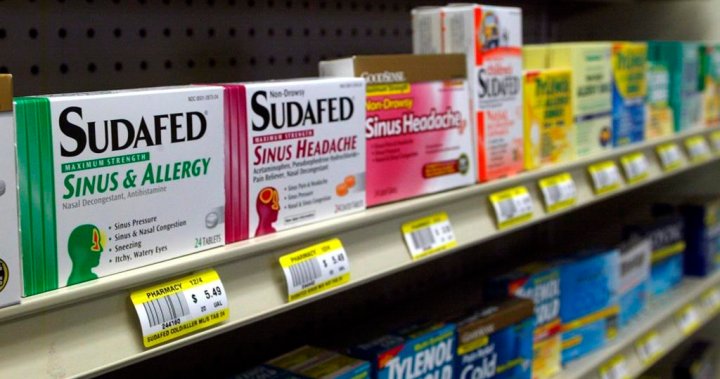A key ingredient found in oral versions of popular nasal decongestants has been labeled as ineffective by the U.S. Food and Drug Administration (FDA).
Research on the long-questioned drug ingredient was reviewed by American government experts who ultimately voted against its effectiveness Tuesday. The drug, phenylephrine, is found in popular decongestants such as Sudafed, Benadryl Allergy Plus Congestion, Dayquil and other medications stocked on drugstore shelves.
“Modern studies, when well conducted, are not showing any improvement in congestion with phenylephrine,” said Dr. Mark Dykewicz, an allergy specialist at the Saint Louis University School of Medicine.
The FDA assembled its outside advisers to take another look at phenylephrine, which became the main drug in over-the-counter decongestants when medicines with an older ingredient — pseudoephedrine —were moved behind pharmacy counters both in the U.S. and Canada.
A 2006 law in the U.S. had forced the move because pseudoephedrine can be illegally processed into methamphetamine. Phenylephrine then launched into popularity as the leading drug in over-the-counter decongestants as a result.
Where Canada stands on phenylephrine
Once a drug is on the market, Health Canada has certain regulatory controls in place.
Drug distributors are required to adhere to the Protecting Canadians from Unsafe Drugs Act (also known as Vanessa’s Law) by reporting on any new concerning serious side effects or if the drug failed to produce the desired effect.
The law applies to an array of products including prescription and over-the-counter drugs, vaccines, gene therapies, tissues and organs, and medical devices.
In March, the federal government put in place changes that require reporting over a greater array of over-the-counter medications, especially natural health products.

Dr. Michael Rieder, a pediatric clinical pharmacologist, says he’s not surprised by the FDA’s vote against phenylephrine.
Rieder previously chaired the Canadian Paediatric Society’s drug therapy and hazardous substances committee, which came to the same conclusion about the drug’s ineffectiveness in 2011.
“We actually issued a statement basically saying that in terms of children’s cough and cold medications, we didn’t recommend use of any of them,” Rieder told Global News.
Phenylephrine as a drug is very poorly absorbed, Rieder explained, and none of the clinical studies conducted by him and his team led to any evidence of its effectiveness in both children and adults.
Nasal decongestants cannot actually heal anyone from their cold or flu, Rieder adds, because it doesn’t have any antiviral or antibacterial properties.
“It doesn’t make you better. You’re going to get better by yourself,” he said. “So the challenge is if they don’t make you feel better, then why take them?”
Despite Rieder’s findings, phenylephrine over-the-counter decongestants have remained available for purchase.
What does the FDA ruling mean for Canadians?
Global News reached out to Health Canada but did not receive comment by publication time.
If the FDA follows through on the panel’s recommendations, Johnson & Johnson, Bayer and other pharmaceutical firms could be required to pull their oral medications containing phenylephrine from American store shelves.
That would likely force consumers to switch to the behind-the-counter pseudoephedrine products or to phenylephrine-based nasal sprays and drops. The panel did not dispute the effectiveness of sprays containing the ingredient.
Jennifer Lake, a pharmacist who is part of the University of Toronto’s faculty of pharmacy, says Canada’s new regulations and the FDA’s ruling on phenylephrine will hopefully mean older medications won’t continue to sit on Canadian shelves if unsafe.
“We assume (medications are safe) because they’ve always been sold this way, but we don’t know if they are safe. We should be marketing things for our population that are effective and safe,” Lake told Global News.
Cough and cold medication continues to be common among North American children despite a lack of evidence for effectiveness and safety, a 2015 study in the Canadian Journal of Public Health says.
But those medications were the leading cause of emergency department visits from adverse drug reactions at the time of the study.
Lake notes that consuming ineffective medication isn’t always inherently unsafe, but it can lead people to assume they should take more than they need.
Consuming beyond the recommended dose of phenylephrine can cause an elevated heart rate or blood pressure.
“So (safety) is actually an important aspect of this,” she said.

What can you use instead of decongestants?
Some nasal decongestants can still be a viable option to treat symptoms of cold and flu, Lake says.
Nasal sprays should be a consumer’s go-to if they must use a decongestant, but for no more than three days, as they may then actually worsen congestion.
Long-term use can cause serious side effects and interfere with certain medications.
Lake says her top recommendation for an alternative to decongestants are nasal saline rinses, either through a neti pot or spray, but encouraged Canadians to talk to their pharmacists.
“I would encourage anyone with questions to go to their community pharmacist. They’ll know your illnesses, they’ll know what products they have and can help more,” Lake said.
Rieder says his top recommendation for relieving congestion is humidification, by drinking lots of water and running a humidifier if you have one. Taking a teaspoon of honey once or twice a day may work as well for coughs related to congestion, he says.
“There are simple measures our grandparents used that probably are the most effective,” Rieder said.
Rieder says it’s important for there to be ongoing public education about what the most appropriate therapy is for coughs and colds.
“As a society we tend to think of medications as, you know, miracle cures and we want a quick fix,” he said.
“We need to get past the quick fix idea and accept the fact that some things have to run their course and some things require time and effort to take care of.”
— With files from Global News’ Katherine Ward and The Associated Press.




